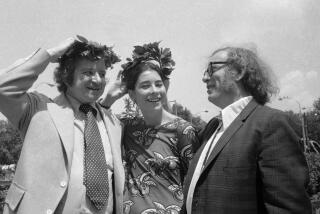Ellen Douglas dies at 91; writer depicted racially conflicted South
Ellen Douglas, a Mississippi native whose novels were widely praised for their portrayal of the racially conflicted South, died Wednesday in Jackson, Miss., after an extended illness. She was 91.
Her death was confirmed by Steve Holland, a funeral home director in Tupelo, Miss.
Set in Mississippi, Douglas’ writing dealt candidly with race relations, families and the role of women. She wrote 11 books, including six novels and several collections of short stories and essays.
Her third novel, “Apostles of Light,” was a 1973 National Book Award nominee. It is a complex novel about the mistreatment of residents at a home for the elderly in fictional Homochitto, Miss., a town that was the setting of many of her works.
“If you don’t have conflict, you don’t have fiction,” Douglas told the Associated Press in a 2005 interview about race relations and other forces that helped shape literature.
Her writing remained a hobby for many years until a close friend, poet Charles Bell, gave one of her manuscripts to an editor at Houghton Mifflin. In 1962, she published her first novel, “A Family’s Affairs,” a book she later said was closely based on two aunts. The New York Times named it one of the best novels of the year.
Born Josephine Ayres in 1921 in Natchez, Miss., she married composer Kenneth Haxton, a fellow student at the University of Mississippi, and had three sons. The couple later divorced.
To guard the privacy of her family, she decided to use Ellen Douglas as her pen name.
The future writer had grown up in Hope, Ark., and Alexandria, La., and spent summers with her grandparents in Natchez, where her family had deep roots. She earned a bachelor’s degree from the University of Mississippi in 1942.
In a 1980 oral history, Douglas said she had been influenced as a writer by the “overwhelming hypnotic style” of fellow Mississippi native William Faulkner, who was living and writing in Oxford, Miss., when she was a student there at the University of Mississippi.
Douglas had been a writer-in-residence at Northeast Louisiana University and the University of Mississippi in the 1970s and ‘80s.
Once she began publishing, her writing came at a furious pace. She wrote “because I loved it” not because it was the only thing she could do, Douglas later said.
“I could’ve been a farmer,” she told the Jackson (Miss.) Clarion-Ledger in 2004. “I would’ve had a lot to learn, but I could’ve done it.... The only thing I could not have had was a life without children and grandchildren. Extended family is what makes the world go ‘round.”
Douglas is survived by her sons, Richard Haxton, poet Brooks Haxton and Ayres Haxton; two siblings; seven grandchildren; and two great-grandchildren.
More to Read
Start your day right
Sign up for Essential California for the L.A. Times biggest news, features and recommendations in your inbox six days a week.
You may occasionally receive promotional content from the Los Angeles Times.



















































